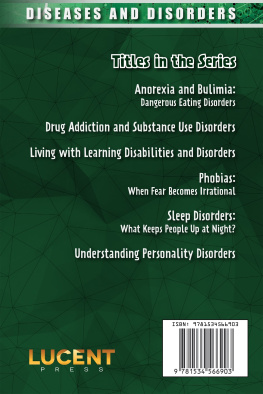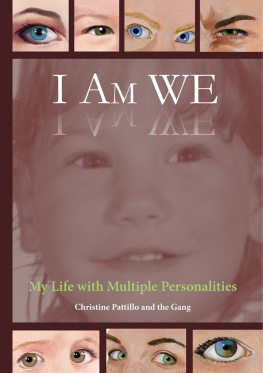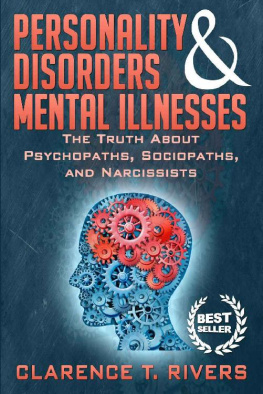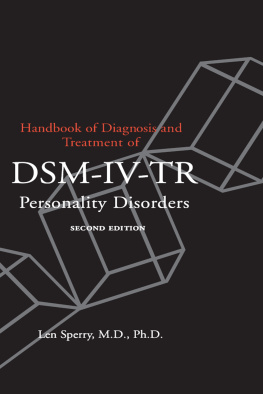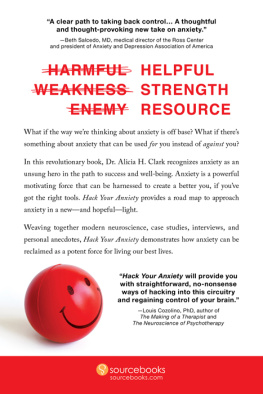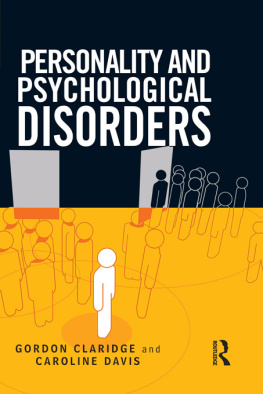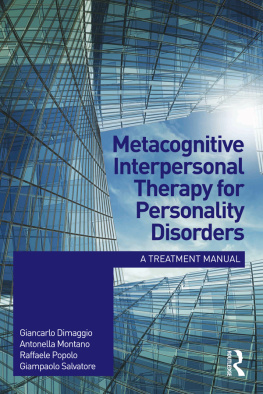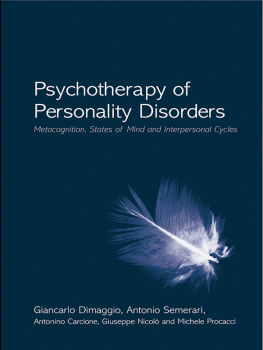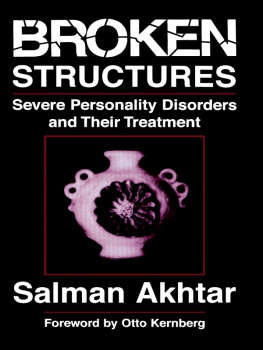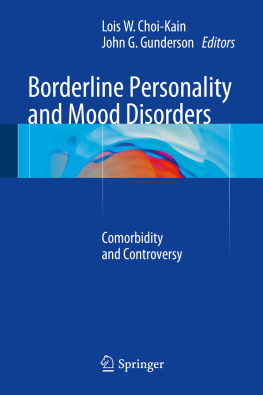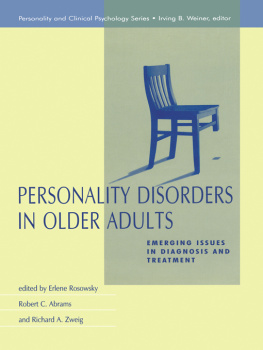Christine Krolewicz - Understanding Personality Disorders
Here you can read online Christine Krolewicz - Understanding Personality Disorders full text of the book (entire story) in english for free. Download pdf and epub, get meaning, cover and reviews about this ebook. year: 2020, publisher: Greenhaven Publishing LLC, genre: Home and family. Description of the work, (preface) as well as reviews are available. Best literature library LitArk.com created for fans of good reading and offers a wide selection of genres:
Romance novel
Science fiction
Adventure
Detective
Science
History
Home and family
Prose
Art
Politics
Computer
Non-fiction
Religion
Business
Children
Humor
Choose a favorite category and find really read worthwhile books. Enjoy immersion in the world of imagination, feel the emotions of the characters or learn something new for yourself, make an fascinating discovery.
- Book:Understanding Personality Disorders
- Author:
- Publisher:Greenhaven Publishing LLC
- Genre:
- Year:2020
- Rating:5 / 5
- Favourites:Add to favourites
- Your mark:
- 100
- 1
- 2
- 3
- 4
- 5
Understanding Personality Disorders: summary, description and annotation
We offer to read an annotation, description, summary or preface (depends on what the author of the book "Understanding Personality Disorders" wrote himself). If you haven't found the necessary information about the book — write in the comments, we will try to find it.
Understanding Personality Disorders — read online for free the complete book (whole text) full work
Below is the text of the book, divided by pages. System saving the place of the last page read, allows you to conveniently read the book "Understanding Personality Disorders" online for free, without having to search again every time where you left off. Put a bookmark, and you can go to the page where you finished reading at any time.
Font size:
Interval:
Bookmark:


Published in 2020 by
Lucent Press, an Imprint of Greenhaven Publishing, LLC
353 3rd Avenue
Suite 255
New York, NY 10010
Copyright 2020 Greenhaven Press, a part of Gale, Cengage Learning
Gale and Greenhaven Press are registered trademarks used herein under license.
All new materials copyright 2020 Lucent Press, an Imprint of Greenhaven Publishing, LLC.
All rights reserved. No part of this book may be reproduced in any form without permission in writing from the publisher, except by a reviewer.
Designer: Deanna Paternostro
Editor: Jennifer Lombardo
Library of Congress Cataloging-in-Publication Data
Names: Krolewicz, Christine, author.
Title: Understanding personality disorders / Christine Krolewicz.
Description: New York: Lucent Press, [2020] | Series: Diseases and disorders | Includes bibliographical references and index.
Identifiers: LCCN 2019000122 (print) | LCCN 2019002708 (ebook) | ISBN 9781534567443 (eBook) | ISBN 9781534567436 (paperback) | ISBN 9781534566903 (library bound)
Subjects: LCSH: Personality disorders.
Classification: LCC RC554 (ebook) | LCC RC554 .K76 2020 (print) | DDC 616.85/81--dc23
LC record available at https://lccn.loc.gov/2019000122
Printed in the United States of America
CPSIA compliance information: Batch #BS19KL: For further information contact Greenhaven Publishing LLC, New York, New York, at 1-844-317-7404.
Please visit our website, www.greenhavenpublishing.com. For a free color catalog of all our high-quality books, call toll free 1-844-317-7404 or fax 1-844-317-7405.
CONTENTS
FOREWORD
I llness is an unfortunate part of life, and it is one that is often misunderstood. Thanks to advances in science and technology, people have been aware for many years that diseases such as the flu, pneumonia, and chickenpox are caused by viruses and bacteria. These diseases all cause physical symptoms that people can see and understand, and many people have dealt with these diseases themselves. However, sometimes diseases that were previously unknown in most of the world turn into epidemics and spread across the globe. Without an awareness of the method by which these diseases are spreadthrough the air, through human waste or fluids, through sexual contact, or by some other methodpeople cannot take the proper precautions to prevent further contamination. Panic often accompanies epidemics as a result of this lack of knowledge.
Knowledge is power in the case of mental disorders, as well. Mental disorders are just as common as physical disorders, but due to a lack of awareness among the general public, they are often stigmatized. Scientists have studied them for years and have found that they are generally caused by chemical imbalances in the brain, but they have not yet determined with certainty what causes those imbalances or how to fix them. Because even mild mental illness is stigmatized in Western society, many people prefer not to talk about it.
Chronic pain disorders are also not well understood even by researchersand do not yet have foolproof treatments. People who have a mental disorder or a disease or disorder that causes them to feel chronic pain can be the target of uninformed opinions. People who do not have these disorders sometimes struggle to understand how difficult it can be to deal with the symptoms. These disorders are often termed invisible illnesses because no one can see the symptoms; this leads many people to doubt that they exist or are serious problems. Additionally, people who have an undiagnosed disorder may understand that they are experiencing the world in a different way than their peers, but they have no one to turn to for answers.
Misinformation about all kinds of ailments is often spread through personal anecdotes, social media, and even news sources. This series aims to present accurate information about both physical and mental conditions so young adults will have a better understanding of them. Each volume discusses the symptoms of a particular disease or disorder, ways it is currently being treated, and the research that is being done to understand it further. Advice for people who may be suffering from a disorder is included, as well as information for their loved ones about how best to support them.
With fully cited quotes, a list of recommended books and websites for further research, and informational charts, this series provides young adults with a factual introduction to common illnesses. By learning more about these ailments, they will be better able to prevent the spread of contagious diseases, show compassion to people who are dealing with invisible illnesses, and take charge of their own health.
INTRODUCTION
WHAT IS NORMAL?
E ach and every human has their own unique personality, or way of thinking, feeling, and behaving, that makes them different from others. Personalities are a combination of characteristics; some of them are inherited from a persons parents, while others are created based on life situations and experiences. Although certain personality differences are accepted in societyfor example, one person might be quiet while another is loudsometimes personality traits become so extreme that they cause a person longterm distress or problems living everyday life. When this happens, the person is generally diagnosed with a personality disorder. This is not one specific disorder; instead, it is a category of disorders that covers several different diagnosable conditions.
There are 10 types of personality disorders, and each can range from mild to severe. Some involve a struggle with oneself; obsessive-compulsive personality disorder (OCPD), for example, is often found among high achievers who strive, often too hard, for perfection. Some disorders involve a struggle against others; avoidant personality disorder, for instance, generally leads the person experiencing it to stay away from social situations due to their fear of rejection. Among the better-known personality disorders are narcissistic personality disorder, in which the person needs to feel important and in control and does not care about the feelings of others; borderline personality disorder, which mental health professionals believe is connected to many cases of suicide; and dependent personality disorder, in which a person tends to be clingy, overly reliant on others, and unable to make their own decisions.
While everyone will have some difficulties throughout their life similar to these symptoms, they are not part of most peoples everyday experience. Because of this, it can be difficult for people to understand the difference between a personality, which everyone has, and a personality disorder. Further complicating matters is the fact that some other mental disorders or even simply everyday stressors can cause some of the symptoms of a personality disorder. Someone with a personality disorder has an inappropriate emotional response to certain events and then acts out on that emotional response, and their symptoms persist for a long period of time. For example, while a woman may be more tearful or quicker to anger at certain times in her menstrual cycle, she is generally able to understand that her emotional responses are not appropriate to the situation, and most women who experience this are able to control their reactions even if they cannot control their emotions. In contrast, personality disorders last much longer, and the people who have them tend to have difficulty controlling their reactions, which can significantly affect their ability to go to school or work.
Next pageFont size:
Interval:
Bookmark:
Similar books «Understanding Personality Disorders»
Look at similar books to Understanding Personality Disorders. We have selected literature similar in name and meaning in the hope of providing readers with more options to find new, interesting, not yet read works.
Discussion, reviews of the book Understanding Personality Disorders and just readers' own opinions. Leave your comments, write what you think about the work, its meaning or the main characters. Specify what exactly you liked and what you didn't like, and why you think so.

